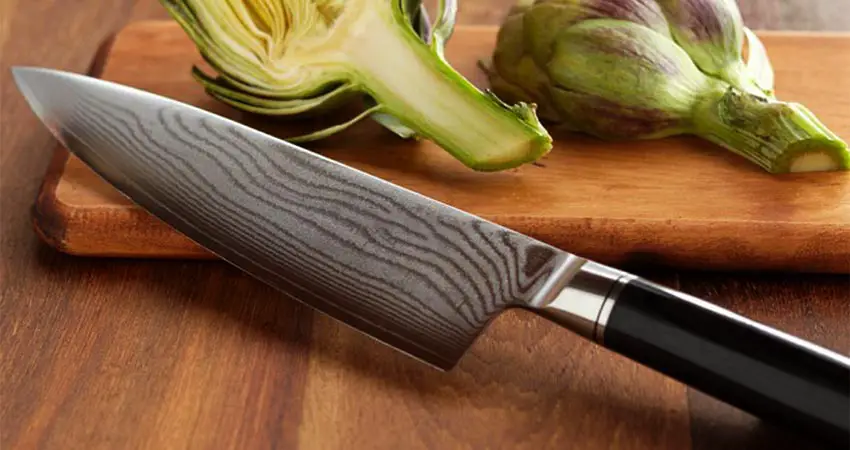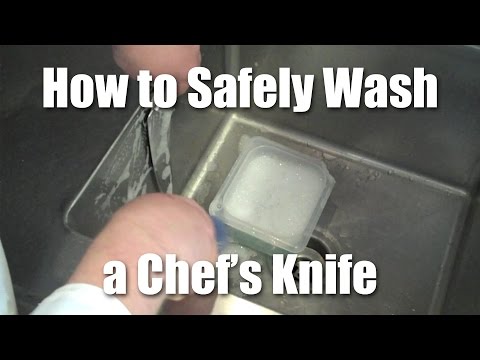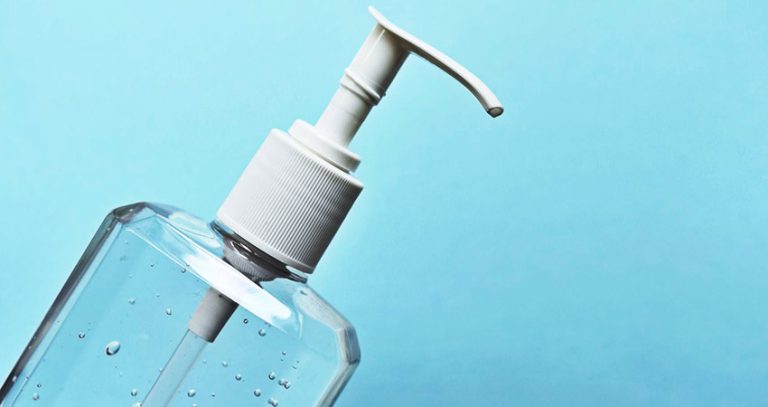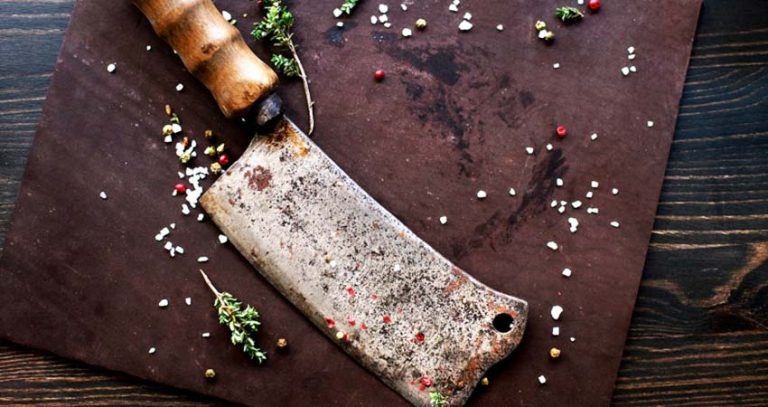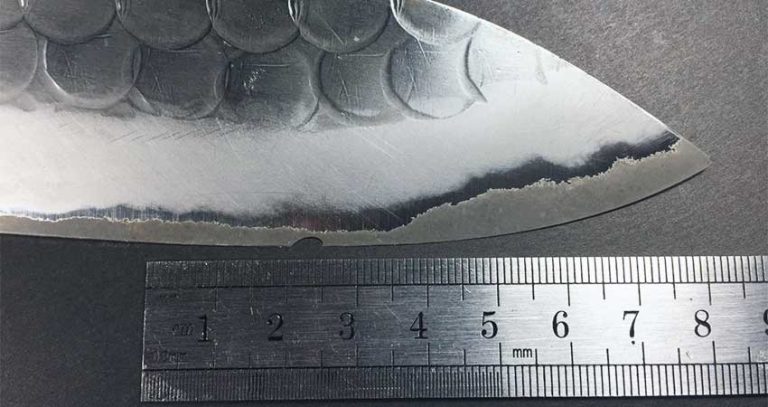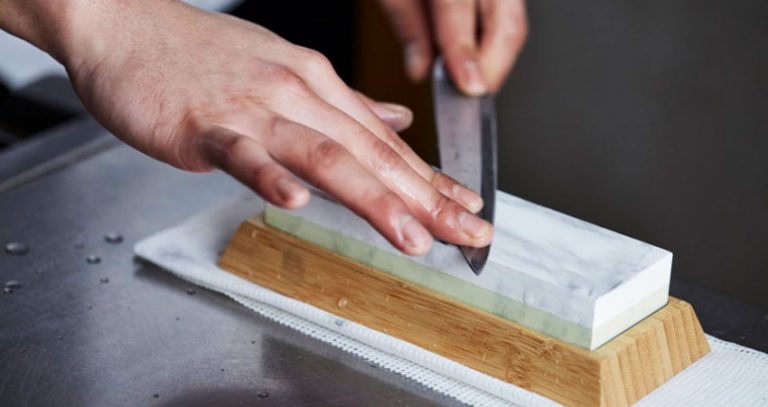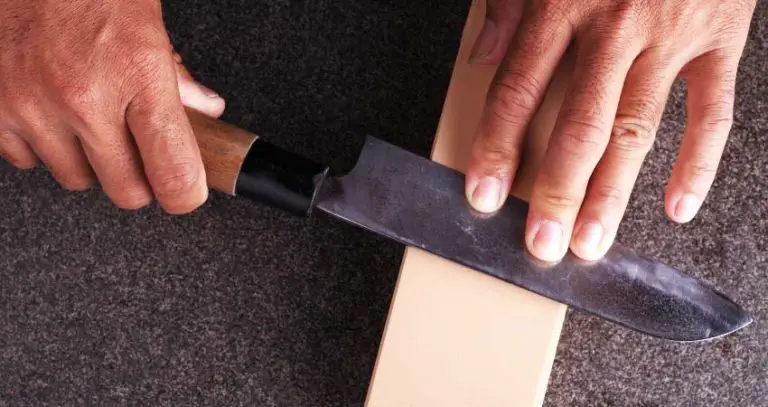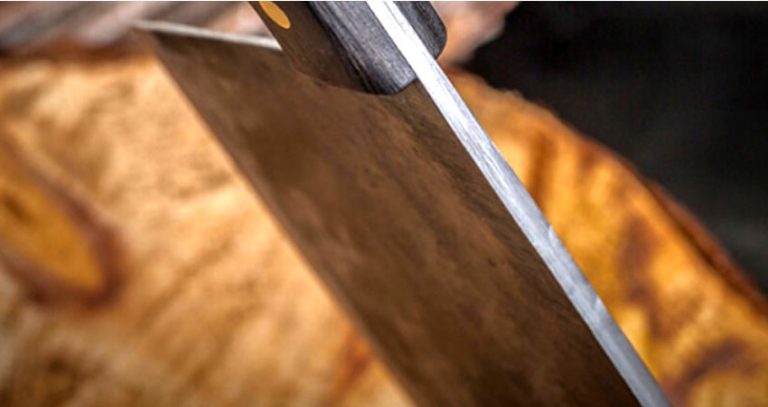How To Clean A Chef Knife? A Proper Guide
Knives can be intimidating. They are sharp and dangerous, but that is what makes them so useful in the kitchen.
A quality knife will not only make your food preparation tasks easier, but it will also give you greater control over the ingredients you are working with and result in a better-finished product.
Keeping your kitchen equipment in top condition is important to ensure that you’re always producing the best quality food for your customers. These knives are incredibly robust, but they need to be properly cleaned and maintained.
Here we will provide some tips and processes that you can follow easily to keep your knife in good shape for a long time.
Process Of Cleaning A Chef Knife!
Every time you use your knife, it will get duller. Over time, it will become harder and harder to slice through food. For this reason, it’s important to wash your knife between uses.
Here is how you can clean a chef knife properly.
Step 1: Washing The Knife With Warm Water And Soap
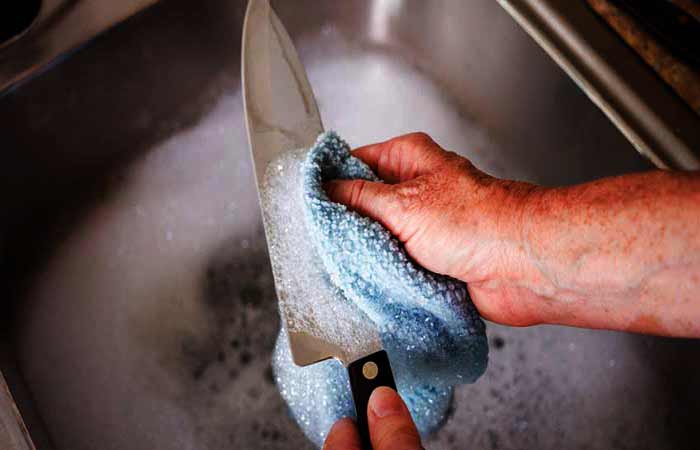
- The first step to sharpening the knife is to wash the knife with warm water and soap to remove any additional dirt or food residue from the blade.
- When knives are washed in this way, it ensures that the edge will be clean when it comes into contact with the whetstone or sharpening stone.
- To wash the knife, fill a bowl with warm water and drop in a little soap. Submerge the knife into the water, making sure to get all sides of the blade wet.
Step 2: Use Your Hands To Clean Substances
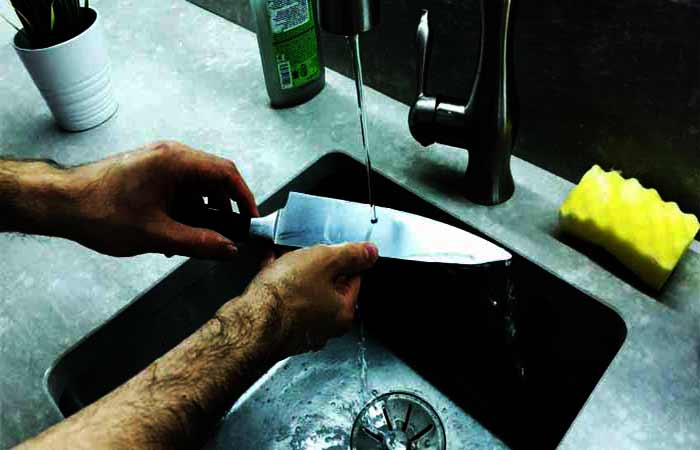
- When you start washing the knife, you may find that the water doesn’t move around on the blade. This is because food particles have created a sticky substance that holds the particles together.
- To get rid of this substance, run your finger around the side of the knife to loosen it up before rinsing it off in the warm water.
Step 3: Scrub The Knife With A Stiff Dish Brush
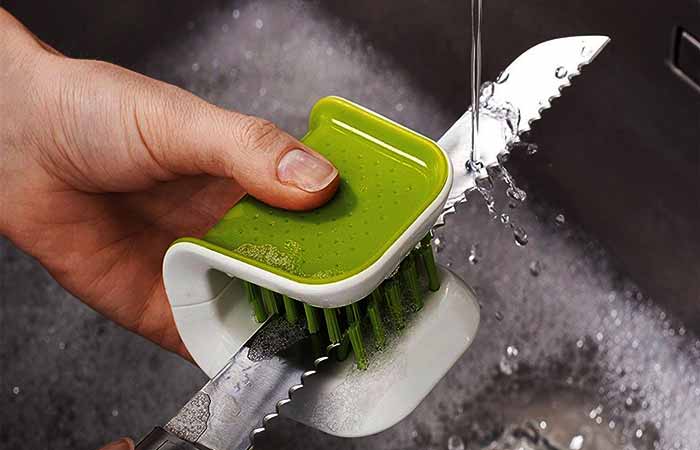
- If a knife has been used to cut something like fish or meat, it can be sanitized by running it through the dishwasher (not recommended, though).
- But if a knife has been used to cut something without meat, you should scrub the blade with a stiff dish brush and hot, soapy water.
- Using the brush will ensure that every bit of food is gone from the knife. The soap will ensure that germs are killed off.
Step 4: Rinse The Knife
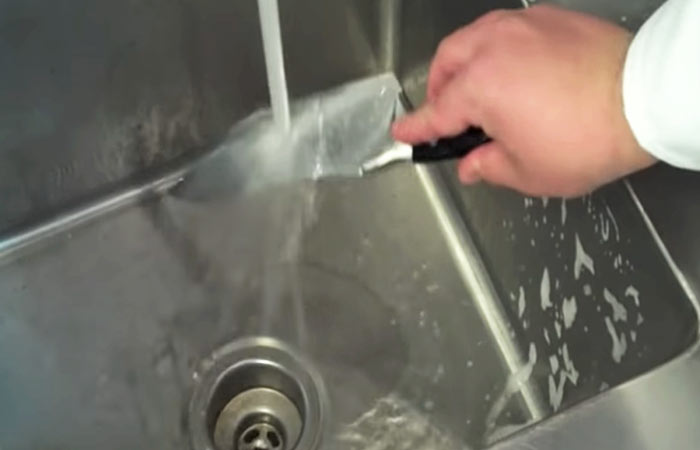
- If you wash your knife with soap, the blade will become rinsed, but the handle will not.
- It is easy to get rid of the smell on the blade by wiping it with a cloth soaked in vinegar.
- But if you want to remove the cigarette smell from its handle, you need to use a few more methods.
- To do this, mix water and lemon juice in a bowl and put the bowl into this mixture for several hours.
- Rinse the knife with the solution and let it dry completely.
Step 5 : Sanitize The Knife
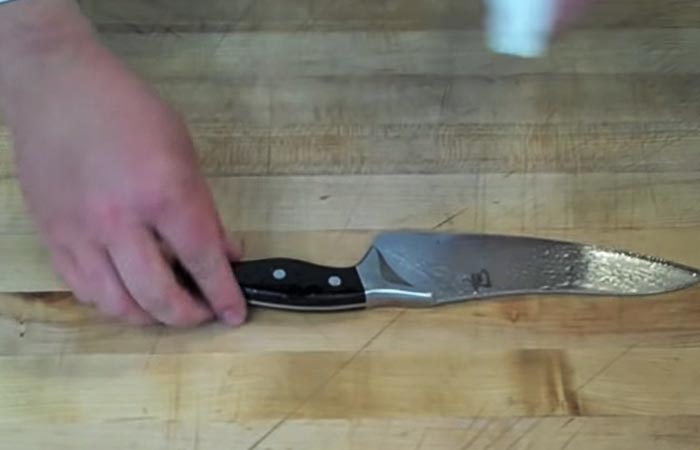
- One extra step you can do before drying it off is to sanitize your knife. It kills all the micro-organisms on your knife.
- Chlorine bleach and quaternary ammonium compounds are the two most common chemicals used as sanitizers.
- Don’t forget to mix them with water before you apply.
- A tablespoon of bleach will need a gallon of water.
- Lay them on a board, counter, or tray and spray your sanitizer.
- Don’t dry them instantly.
- Give the solution a minute to work and then move on to the next step.
Step 6: Drying The Knife With A Towel
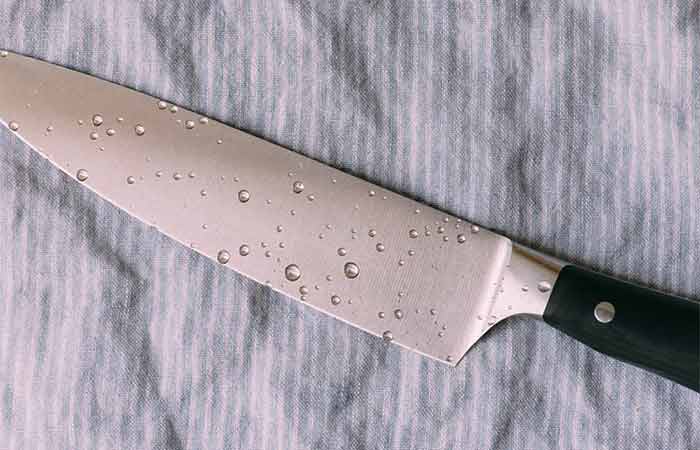
- This process is pretty straightforward. You put a towel on the knife and you start rubbing it with the towel.
- The purpose is to make sure that the towel absorbs all of the water, so that it will not rust your knife.
- Then store your knife in its sheath, or wrap it up in cloth.
What To Avoid When Cleaning A Chef Knife?
One of the most important things to remember when cleaning a chef’s knife is avoiding harsh chemicals or abrasive materials. These can damage the blade and make it less effective.
Instead, use mild dish soap and warm water. Be sure to rinse the knife thoroughly after washing to remove the entire soap residue.
Another thing to avoid is using a washcloth or scrubbing pad to clean the knife. While these can be effective, they are much too abrasive for something you plan to put in your mouth later.
Instead, use a damp cloth or towel and wipe down the blade carefully.
Tips To Keep Your Knife Always Clean and Safe
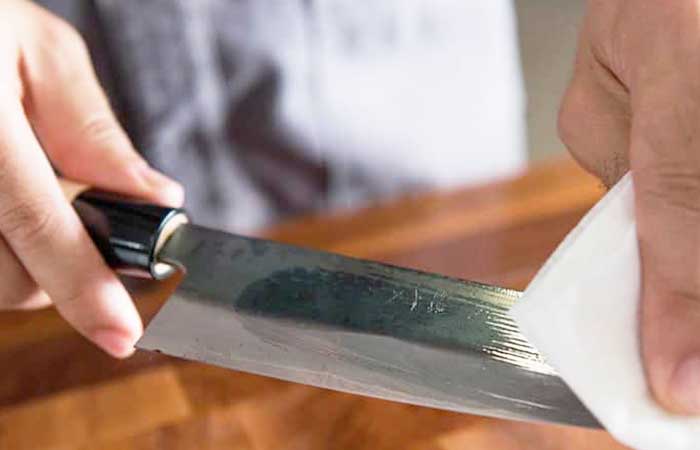
Just like any other tool, your knife must be kept clean and in good condition. Rust and lack of care can greatly reduce the sharpness of your knife’s blade and cause more serious damage.
Here we suggest some tips to keep your knife always clean:
- After using it, choose a dry place with no dust or dirt to clean and dry your knife.
- Wipe off any moisture on the blade with a dry cloth; do not store your knife in a damp place.
- Use a sharpening stone to keep the blade edge sharp; this will also remove any built-up dirt or food residue.
- Apply light oil to the blade to prevent rusting; make sure to wipe off any excess oil.
- If your knife has a wooden handle, regularly apply a light coat of wood oil to keep it in good condition.
- Place your knife in a safe and secure place when you’re not using it.
- Regularly check the condition of your knife and blade; if you find any damage, don’t use it. Just replace the blade or repair it as soon as possible.
- Wash your knife with a mild detergent and dry it before using it. Also, never put your knife in the dishwasher.
Following these tips will help you keep your knife clean and in good condition, ensuring that it lasts for many years of use.
Final Verdict
There are a lot of different ways to clean a chef’s knife. Some people prefer the old-fashioned way of using a wet towel and wiping it down.
Others prefer using a dishwasher or handwashing it with soap and water.
A sharp, clean knife will help you prepare food faster and ensure the safety of everyone around it. When you regularly clean your kitchen knives, they can last much longer and stay sharper.
Follow these simple steps if you’re unsure how to clean a chef knife.

